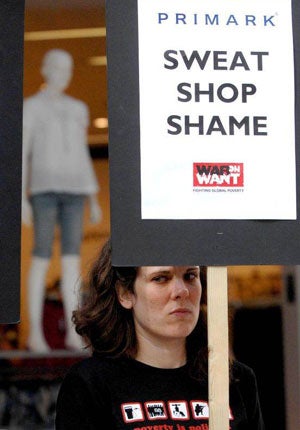BBC crisis over 'fake' sweatshop scene in Primark documentary
Trust says that 'Panorama' should consider giving back its Royal Television Society award

Your support helps us to tell the story
From reproductive rights to climate change to Big Tech, The Independent is on the ground when the story is developing. Whether it's investigating the financials of Elon Musk's pro-Trump PAC or producing our latest documentary, 'The A Word', which shines a light on the American women fighting for reproductive rights, we know how important it is to parse out the facts from the messaging.
At such a critical moment in US history, we need reporters on the ground. Your donation allows us to keep sending journalists to speak to both sides of the story.
The Independent is trusted by Americans across the entire political spectrum. And unlike many other quality news outlets, we choose not to lock Americans out of our reporting and analysis with paywalls. We believe quality journalism should be available to everyone, paid for by those who can afford it.
Your support makes all the difference.BBC journalism was plunged into one of its deepest crises since the Hutton report of 2004 yesterday, when the governing BBC Trust questioned the authenticity of footage broadcast by its flagship programme Panorama in an investigation into the ethical standards of the fashion giant Primark.
The director of BBC News Helen Boaden went on the broadcaster's news channel yesterday to apologise after the Trust found that "on the balance of probabilities", footage broadcast in 2008 claiming to show Primark using child labour in India "was not authentic".
Ms Boaden told viewers the Trust ruling was "very, very serious" and "extremely chastening". She said: "No one could take it more seriously than I do and I know that the Current Affairs team will be looking at their processes in future."
Primark last night said that the programme was "based on fabrication and was littered with poor journalistic practices". In a statement, it said: "Millions of people have been deceived by Panorama. Viewers who watched the programme, shoppers who were then fed the lie, sourcing experts who believed the lie, teachers and pupils who viewed the programme in lessons, have all been badly let down." The Trust ordered the BBC to broadcast an apology on a forthcoming edition of Panorama. It said the offending programme was not to be repeated or sold and that BBC executives should consider returning the Royal Television Society award the programme won in 2009.
"Great investigative journalism must be based on the highest standards of accuracy, and this programme on Primark failed to meet those standards," said Alison Hastings, a BBC trustee and chairwoman of its Editorial Standards Committee.
"While it's important to recognise that the programme did find evidence elsewhere that Primark was contravening its own ethical guidelines, there were still serious failings in the making of the programme. The Trust would like to apologise on behalf of the BBC to Primark and to the audience at home for this rare lapse in quality."
Last night senior BBC figures expressed dismay at the failings by Panorama. Will Wyatt, a former deputy to the BBC director-general, said the incident was worse than the BBC's misrepresentation of footage of the Queen in 2007, which he investigated for the Corporation.
"That [the Queen incident] was a bad mistake but it was not of the same order as this. It's always serious if you present the public with something which you say is evidence of wrong-doing and it isn't," he said.
Kevin Marsh, former editor of the BBC College of Journalism and editor of the Today programme at the time of the Hutton report, said: "It's very serious and very bad for Panorama. Fake footage – even if it's illustrating something that the team genuinely thought was true – is a no-go area I'm afraid."
Primark complained that it was "forced to carry out its own investigation into the allegations made by the programme and, based on this, and staggeringly based on evidence in the possession of the BBC even prior to broadcast, Primark demonstrated the lie underpinning the programme.
"Primark has had to persevere and pursue the matter for a period of three years."
The controversial footage was obtained by journalist Dan McDougall, who is Africa correspondent for The Sunday Times and has a track record for exposing the use of child labour. He told Press Gazette last night that the Trust finding was "unjust" and "deeply damaging to independent investigative journalism".
Primark said it also questioned other pictures shot by McDougall of a boy and a girl in a refugee camp.
The only evidence of wrongdoing it now accepted as being correct from the documentary was unauthorised home-working by adults. "We accept that work on Primark clothes should not have been done by adults outside the main supplier factories," a spokesman said.
Join our commenting forum
Join thought-provoking conversations, follow other Independent readers and see their replies
Comments